Turkish Migrant Drowned Attempting Illegal Croatia Border Crossing
February 15, 2021 – Tragedy on the Bosnia Croatia border yesterday as a lifeless body was found in the River Glina. The Turkish migrant drowned attempting an illegal crossing into Croatia
The body of a Turkish citizen was discovered at the river Glina in northwestern Bosnia and Herzegovina. The citizen had been missing for days and it was sadly already suspected the Turkish migrant drowned after becoming separated from a group they were travelling with.
Seven Turkish migrants had attempted to illegally cross the border between Bosnia and Herzegovina and the Republic of Croatia on the Glina River during the night of Thursday 11 February 2021 and the morning of Friday 12 February 2021. They believed the water level in the area was low. Alongside extremely cold temperatures, the nighttime darkness they used as a cover for the illegal border crossing attempt, must have made the journey treacherous. The tragic result is that one Turkish migrant drowned.
According to Svevlad Hoffman, advisor to the director of the BiH Border Police, six migrants were saved from drowning at the time of the crossing, but one of the group disappeared. This Turkish migrant drowned.
"It was suspected that there was a drowning, which was unfortunately confirmed today," Hoffman said. He explained that the Ministry of the Interior of the Republic of Croatia, whose members had found the Turkish migrant drowned, had informed them about the discovery of the body. Police from Bosnia and Herzegovina had informed Croatian counterparts about the situation at the time of the migrant's disappearance.
Investigation of the case was taken over by the State Prosecutor's Office of Bosnia and Herzegovina, and six Turkish citizens were handed over to the jurisdiction of the Service for Foreigners Affairs of BiH.
The river Glina, where the Turkish migrant drowned, forms a natural border between Croatia and Bosnia and Herzegovina. On the Croatian side of the border lie Karlovac County and Sisak-Moslavina County. On the Bosnian side of the border, many large camps have sprung up containing migrants who wish to attempt an illegal crossing into Croatia. Croatia is rarely their intended destination. Most are hoping to travel further west into the European Union.
The crossing where the Turkish migrant drowned is not the only border through which migrants try to enter. On Friday 12 February 2021, Osijek-Baranja police rescued a Syrian migrant family from inaccessible Slavonia wetlands. They had become cut off on an island and surrounded by swollen waters in the area around Kopacki rit Nature Park after crossing the border from Serbia.
Turkey Advises Migrants on Routes to France, Germany: Avoid Croatia
March 6, 2020 - Turkey has released a map of route options for migrants hoping to reach France and Germany, and Croatia has been bypassed. Greek media outlets recently reported Turkey's geographical map with "routes" running from Turkey into Western Europe.
They claim that it is further evidence that Ankara has officially participated in the developing crisis by encouraging migrants and refugees to enter the EU illegally. The map, along with instructions in Arabic, was published by the official Turkish state television TRT Arabic and posted on their Twitter page and Facebook page on February 28, 2020.
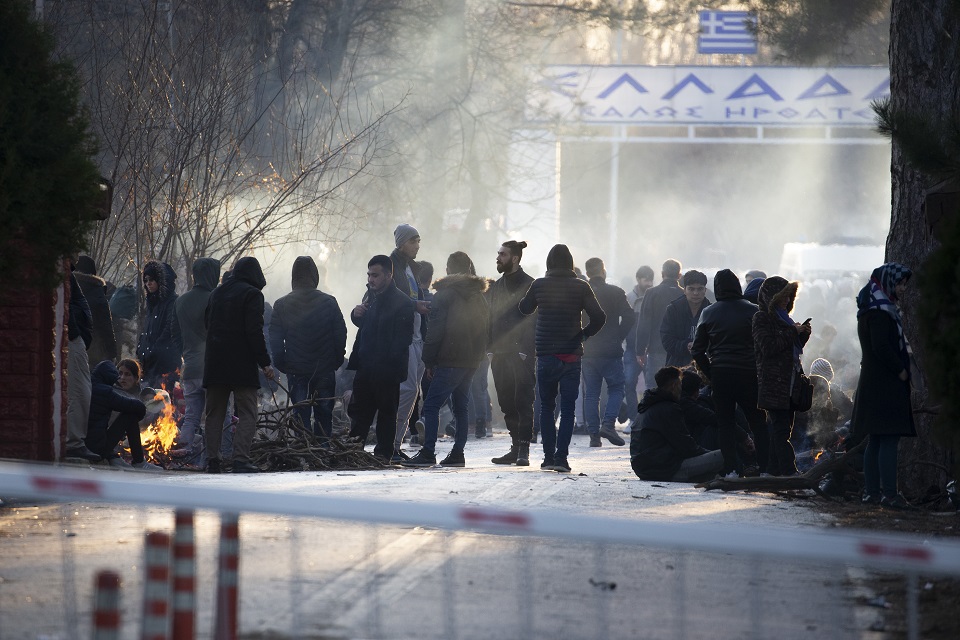
Turkey Migrant Map Shows Five Routes to France, Germany
According to the map, migrants and refugees are directed to five route options through Turkey to five "entry points" to Greece: four on its islands, and one via the land border, across the Evros river, where the Greek army was recently deployed, and where conflicts across the border line are now almost continuous.
Upon arrival in Greece, migrants and refugees would, according to the map, cross through Italy on their way to France, which is shown as a major destination.
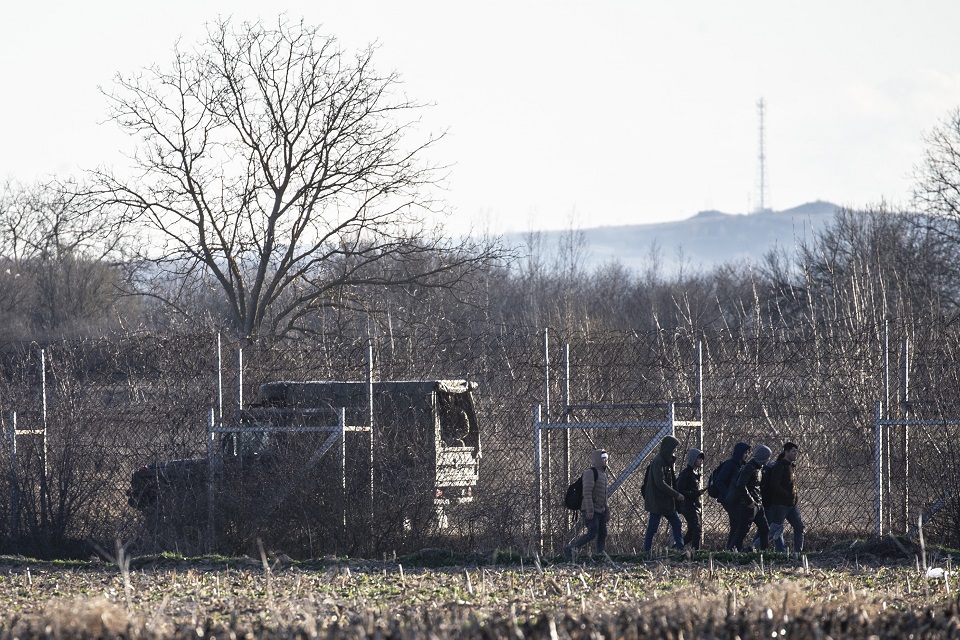
TRT Arabic Map Bypasses All Former Yugoslav Countries
The other route from Turkey heads Northwest, bypassing all the countries of the former Yugoslavia, then passes through Bulgaria, Romania, Hungary, Austria, where the road branches in two directions: one towards Germany and on towards France, writes Dnevnik.
Turkish President Recep Tayyip Erdogan has threatened European Union countries with a new migrant crisis if they do not support his efforts in the Syrian civil war and provide Turkey with additional aid for housing migrants.
EU governments have refused to increase financial aid to Recep Tayyip Erdogan’s Turkey under the terms of their €6 billion migration deal, insisting Europe would not bow to threats from Ankara over opening its border with Greece, according to the Financial Times on March 6, 2020.
Following an emergency meeting in Zagreb on Friday, EU27 foreign ministers held firm on their criticism of Mr Erdogan for using migrants for “political purposes” after a build-up of refugees on the Greek-Turkish border. Mr Erdogan had vowed to open the country’s frontier with Europe over the weekend, sparking the prospect of a new refugee crisis.
Germany has been pushing for more financial support for Mr Erdogan to stave off any repeat of Europe’s 2015 migration crisis. Before the events of this week, member states had discussed the possibility of freeing up about €1 billion from the EU’s current budget for the Turkey facility. But ministers on Friday said they would not ramp up aid in response to pressures on the Greek border.
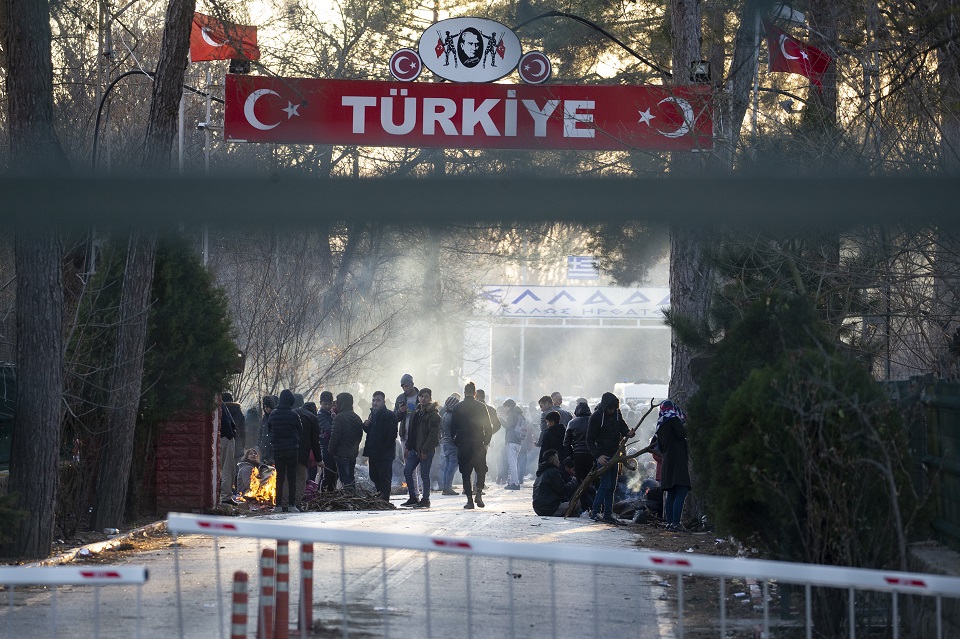
Turkey Demands More EU Aid to House Migrants
Turkey has demanded more financial help to integrate the nearly four million refugees in the country. The EU has been paying out cash to projects to help the integration process since 2016 but key programmes are due to run out of money soon. Ankara has complained that the cash disbursements are too slow and accused the EU of failing to live up to its promises to liberalise visas for Turks as agreed under the deal.
European governments have disagreed over how to engage with Turkey after Mr. Erdogan’s comment prompted thousands of refugees to head to the border with Greece, sparking violent clashes. Athens has pushed for a tough condemnation of Mr. Erdogan’s actions but has met resistance from Berlin and The Hague, which want to keep diplomatic ties open with Ankara.
EU diplomats monitoring the border developments said the flow of migrants towards Greece had stopped in recent days and Mr Erdogan was back in compliance with the terms of the 2016 deal.
Follow this page and our Politics page for Total Croatia News updates on the migrant crisis in Croatia.
Croatia Migrant Crisis: Interior Minister Will Not Send Army to Border
March 2, 2020 - Davor Božinović, the Interior Minister of Croatia, emphasised that there is no need to send the army to the border, because Croatia deals with illegal migrants daily. He added that Croatia’s border protection system maintains communication with colleagues from other countries on every level. And they are working together to pursue a diplomatic solution.
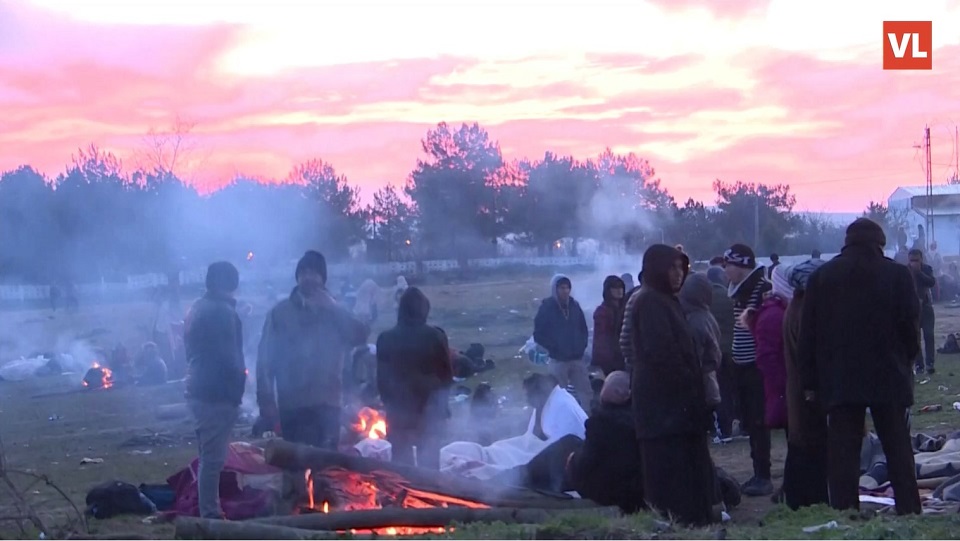
Croatia Eastern Border: No Increase in Illegal Migration
“There has been no reported increase in illegal migration on Croatia's eastern borders. The police are doing their job and the situation is no different than yesterday or the day before. Croatia has been dealing with illegal migration every day for almost three years now. That is why, even with these new circumstances, we can confirm that our border protection system fully operational and doing its job,” Interior Minister Davor Božinović said today. He noted that presently there is no need to send the army to the Croatian border, even though that remains a legal possibility, according to Marina Borovac/Večernji List on March 2, 2020.
“We will see how the situation on the Greek and Bulgarian borders develops, in relation to Turkey’s recent actions (release of migrants from their country). We are in close contact with our colleagues (from other countries) on every level. One direction we are going is certainly the diplomatic route. After all, the President of the European Council, the President of the European Commission and the President of the European Parliament will visit the Greek border tomorrow to see the situation there. At the same time, talks are underway with the Turkish leadership, which is part of the diplomatic role. The aim is to return to the EU-Turkey agreement of 2016,” Božinović added, and is confident that diplomacy would be the goal.
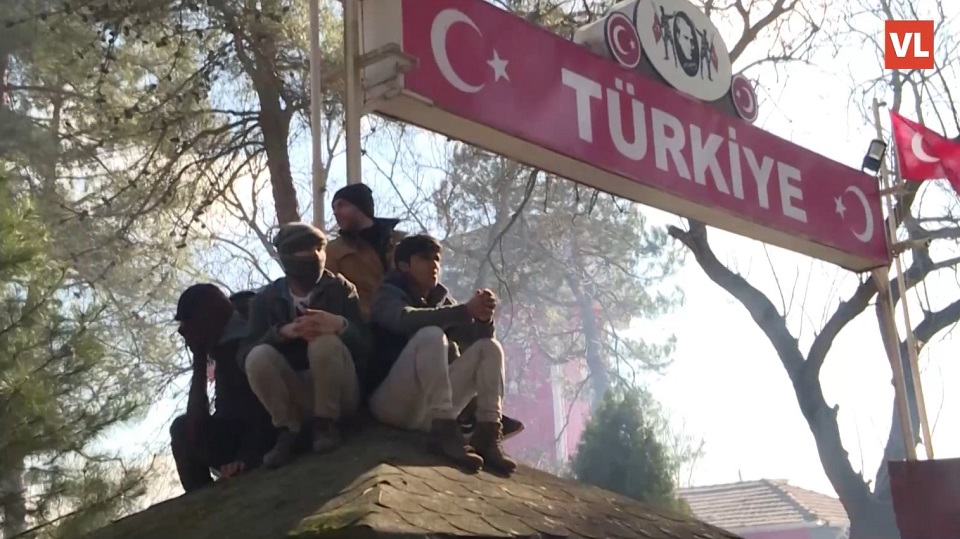
Croatia Will Discuss Border Assistance to Greece, Bulgaria
Božinović announced an upcoming meeting of European interior ministers to discuss what assistance can be sent to Greece and Bulgaria. He says both countries are committed to deterring illegal migration, which is in the wake of the new European Commission's policy regarding the protection of the EU's external borders. Božinović recalled that there was a migrant wave in 2015 because Greece had allowed migrants to pass through their territory.
“This is the only way to prevent the 2015 and 2016 scenario from happening again. Today, not only Greece, but every country has made their objectives very clear regarding the protection of their borders along the so-called Western Balkan route,” the interior minister concluded.
Croatia will emphasize its plight with protecting Europe's borders, but reiterates that the issue of the migrant crisis can only be resolved through (the agreement upon) a common European policy.
Follow our Politics page and this page to keep up-to-date on the migrant crisis along the Western Balkan route in Croatia.
Croatia: Dubrovnik Police Rescue 36 Migrants on Inflatable Dinghy in Aegean
During surveillance of the European Union's maritime border with Turkey, as part of the Frontex Poseidon mission, four naval officers from Dubrovnik, Croatia rescued 36 migrants from an unmanned dinghy in the Aegean Sea on February 10, according to Dubrovnik police who were monitoring the area.
A migrant dinghy was observed in the area from the Evros (Marica) river delta heading toward Makri, Greece. Cries were heard from the small inflatable vessel, and officers immediately came to the rescue.
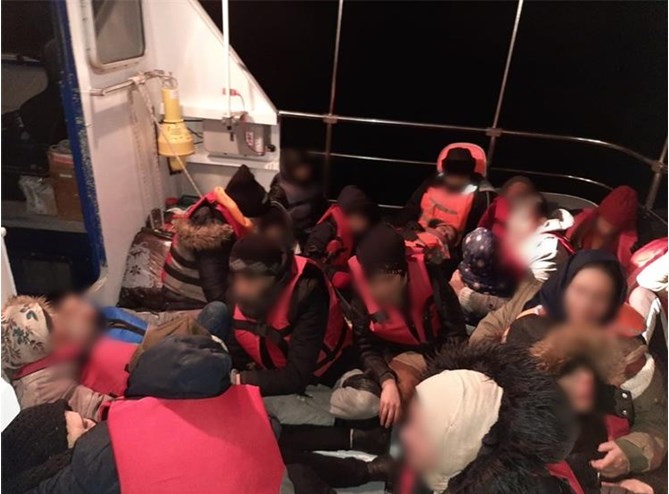
Croatia Police: Migrants on Dinghy Chilled, Dehydrated, Unconscious
"They found 36 foreign nationals on the dinghy, including five children, 11 women and 20 men. All were in poor health: chilled, dehydrated and some were unconscious. The inflatable had run out of fuel and the sea temperature where they were found was only 2 degrees Celsius. It is difficult to say what might have happened to them had they not been rescued,” the Dubrovnik-Neretva Police Department pointed out.
The migrants were transported to a police vessel where officers provided them with water, hot drinks and thermal foil to warm them, after which they were transported to the port of Alexandropolis. They were met there and put under the care of the Emergency Medical Service according to Index on February 14, 2020.
"Out of the 36 migrants, five were hospitalized, while the rest, after receiving medical assistance, were transported to a reception center following further treatment in accordance with national and European legislation," the Dubrovnik police added.
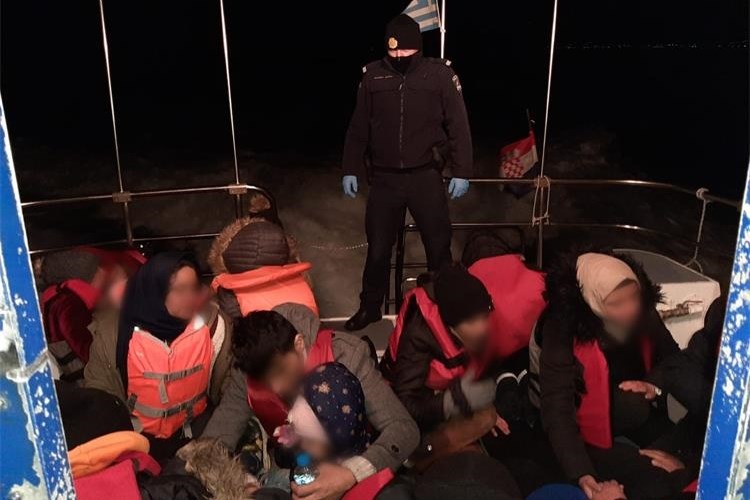
Greece Reports 60,000 Migrant Arrivals in 2019, 4,100 Arrivals in 2020
Following more than 60,000 arrivals last year, more than 4,100 refugees and migrants have reached Greek shores so far in 2020.
Recently, the Croatian parliamentary Committee on Home Affairs and National Security unanimously decided to conduct direct oversight of Croatian police work following complaints about the police treatment of migrants, Committee Chairman Ranko Ostojić (SDP) told the press after the committee meeting on February 6, 2020.
An archive of Total Croatia News coverage on the migrant crisis in Croatia can be accessed here.
Croatia Border Town Shaken By Migrant Burglaries: Ilok Locals Live in Fear
While EU politicians, leaders, foreign journalists and human rights organizations play political football, assign blame and discuss solutions for the migrant crisis along the Balkan Route; frightened residents of Croatia border towns, like the town of Ilok, are locking themselves in their homes at night out of fear of burglaries and much worse.
“We are scared! In the middle of the night, we caught migrant burglars circling our house. I thought my son was going to work, but sensed something suspicious and saw two masked people at our front door,” reported one shaken Ilok local.
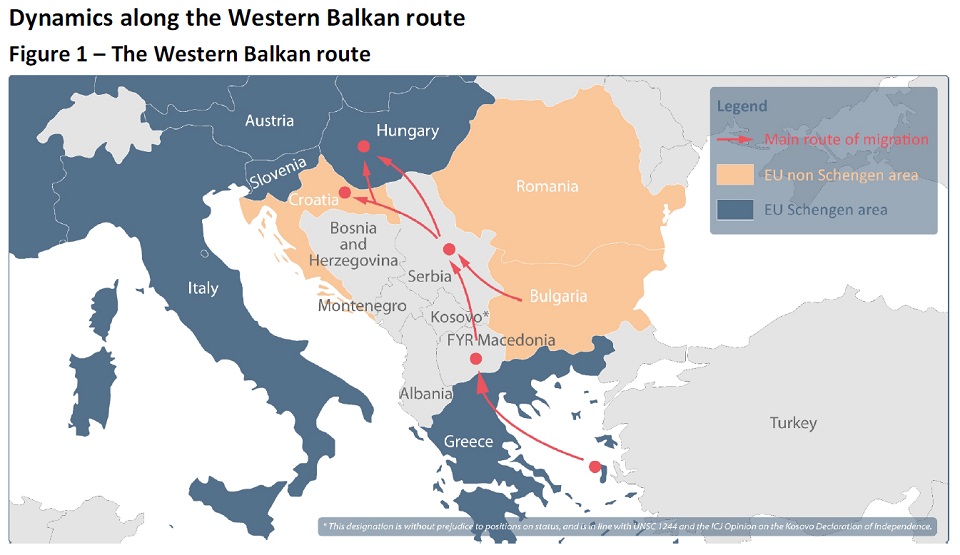
(Note that Hungary has built an electric fence spanning its border, which has halted migration.)
Croatia Police Not Publicly Reporting Ilok Migrant Burglaries
In the Fall of 2015, during the great migrant crisis, more than half a million migrants passed through Eastern Croatia on their way to more economically desirable Western European countries. Not a single major incident, or even any minor incidents, were reported during the entire relocation process. However, four years later, locals in some border towns in the same part of Eastern Croatia are living in fear, according to Branimir Bradarić/Večernji List on January 25, 2020. Migrants are entering their towns and villages and burglarizing shops, and a recent attempt was even made to break into a house. There have been also reports of car theft and one incident ended with a car accident in which several migrants were injured while trying to escape authorities in a stolen vehicle.
All this has happened over the last half year but there were signs of trouble even before then. However the police have avoided discussing these burglaries in their regular reports the media. Therefore, frightened residents have decided to go public with these incidents on their own. The situation has deteriorated most notably in the Eastern Croatia city of Ilok, where residents are no longer willing to remain silent about their fears for safety in their own homes.
Frightened Ilok Residents Reporting Migrant Burglaries Directly to Media
The last in a series of frightening events occurred ten days ago when two migrants, dressed in dark hooded jackets, tried to break into the home of the Lončar family in Ilok. Remembering that day, Irjana Lončar recalls hearing noises around 4:30am.
“We were sleeping when I heard noises in the yard and by the door. It sounded like someone was walking nearby and I thought it was my son leaving for work. But the lights were off, which was strange, so I got up to see what was happening. At that moment, I saw two unfamiliar masked people at our front door. They were trying to force our door open by destroying the lock with a device, which I think was a drill. I started screaming and yelled for my husband, but the two burglars had escaped by then,” recalls Lončar, who was still trembling with fear.
Since the lock was destroyed, her husband could not get the front door open immediately. After succeeding, he jumped into their car and tried to follow the migrant burglars. Irjana watched from the window as the pair fled down the road. Later, she discovered that the burglars had also been trespassing in their yard and had broken into their attic, where they stole two knives and a knife sharpener. They swiped the Lončar’s New Year's light decorations and made off with her husband's hunting backpack. Then she discovered that the pair had tried to open the kitchen window with a sharp object to enter the house from there. Police responded to her call for help very quickly, but by that time the migrants had long vanished into the darkness.
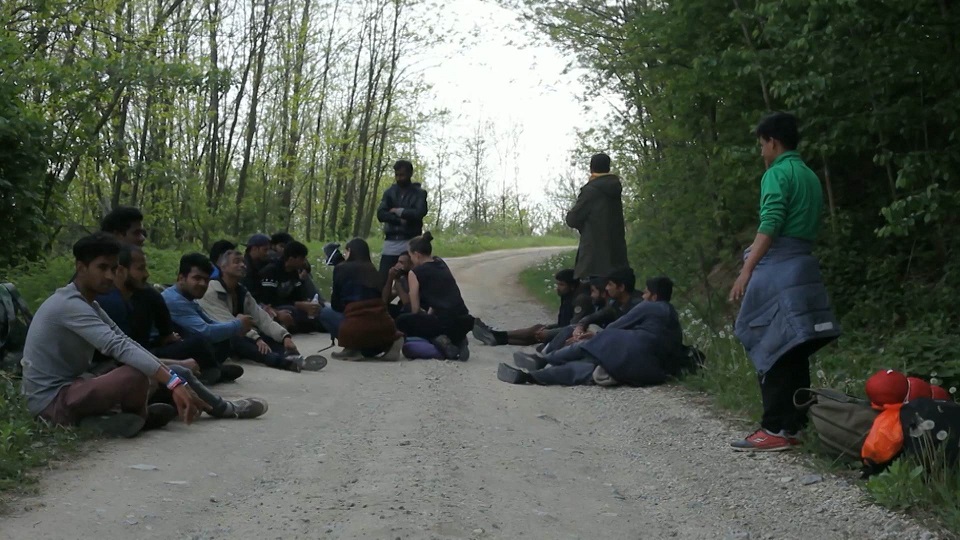
Ilok Residents Concerned for Safety and Property
“I'm really scared now. From that day, my life has not been the same. I have a difficult time sleeping and am always on the alert for unusual noises. Every little noise will jolt me wide awake as does the sound of barking dogs. I'm afraid that they'll try to break into my house again. And, I'm particularly scared because nobody knows what these people are prepared to do. Nor does anyone know what they would have done if they had entered our house, or how it all could have ended. We just want to feel safe in our town again, and especially safe in our own home. Unfortunately, that's not the case anymore,” Lončar admits.
She adds that, after their burglary, they started hearing about several similar break-ins throughout town – and other locals have witnessed migrants breaking into homes. She claims that there are currently several unoccupied houses in Ilok, and migrants are breaking into them so they can hide temporarily before continuing their journey further into the interior of Croatia and the rest of Europe.
The Ilok locals have also reported finding discarded clothing all over town as migrants change their clothes before continuing their journey westward. There have also been reports of migrants crossing the border and continuing down the road before they are caught by police.
Ilok Break Ins and Burglaries Widespread
Jadranka Tomašić’s shop has also been hit by migrants. They have succeeded in burglarizing her shop in two out of three attempts. In both of those cases, according to Tomašić, they stole certain brands of cigarettes, some alcohol and Nescafé. About 20,000 HRK (2687 EUR) of merchandise has been stolen from her shop, and the front door of her store was damaged too. They also ran off with all the cash they found.
“I do not feel safe here anymore, and I am not the only one. Other Ilok residents don’t feel safe in their town either. In addition to everything else, you can see the effects of fear in front of elementary schools at the end of the school day. Parents are now coming to school in cars to pick up their children. People are locking themselves in their homes before dark and are avoiding going out in the evening. No matter how you look at it, the situation is not at all simple or straightforward,” Tomašić reveals with concern.
She adds that in addition to the burglaries in her shop, there have been burglaries in the suburban settlements of Bapska and Šarengrad. After the burglary in Šarengrad, the perpetrators were apprehended. After one of the burglaries at her store, a large knife was found, which was to be believed to have belonged to migrants. She also recalls a situation that occurred last summer when a migrant tent was found in a corn field across the street from her store, during the corn harvest. It was in a populated part of Ilok and nobody aware of that it was there until the harvest.
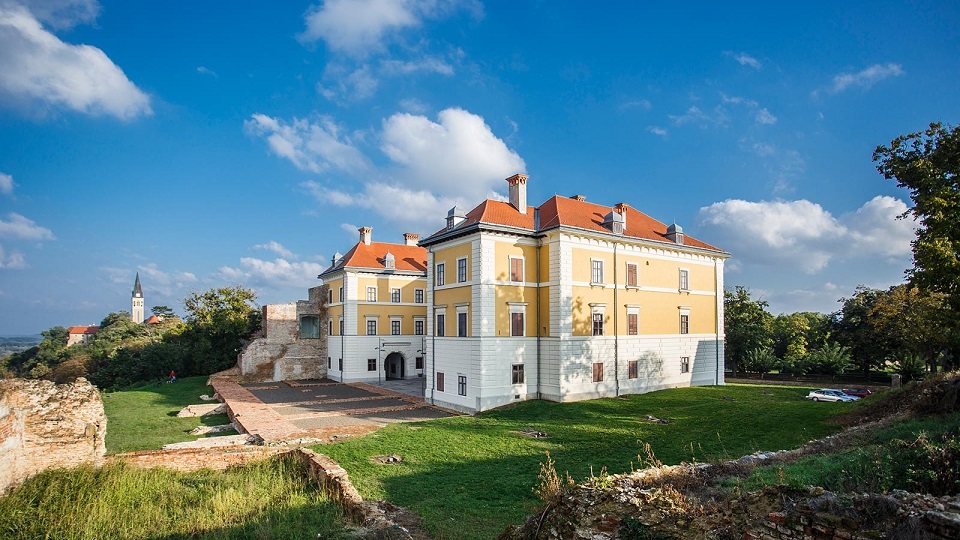
‘We just want to live and work normally’
“We just want to live and work normally, but that's not the case now. The worst part is that feeling of insecurity. These people have shown no fear, and that is why we are very afraid. It really bothers me that nobody is talking about this. I have no objection to the job the police are doing and do not expect that they, or the mayor, will be able do something overnight. They cannot do anything because they do not have the necessary tools, but this problem must be addressed in a systematic way,” Tomašić points out. She adds that many locals have been reporting burglaries, including those who have had their safes broken into and contents stolen.
The well-known Ilok agronomist and winemaker Ivan Buhač was also hit by migrants, but he managed to avoid burglary. He left his unlocked vehicle parked outside his house. Someone entered it and wanted to start it up and drive off. As the keys were not inside; they emptied the vehicle in search for the keys. However, the car itself was undamaged.
“The fact is that these incidents, which are extremely unusual for Ilok, happen regularly now and so it's not surprising that people do not to feel safe. Recently, burglaries and attempted burglaries have been reported in people’s homes. We all hope that this will all end soon and that we can go back to living normally, because this is not definitely the case now,” Buhač admits.
Commenting on recent events, Ilok Mayor Marina Budimir says the city authorities are aware of the problem and are in constant contact with the Croatia Interior Ministry and police in Ilok.
Ilok Police and Mayor: No Reason to Panic
“Everyone is working as hard as they can to resolve this problem, but I don't think there is any reason to panic. The problem is very present, and it’s important to compare how our residents live now as opposed to before: how they move about in town and go to work and school. Unfortunately, this problem in Ilok will continue since we are right on migrant route through Croatia from Serbia and beyond. Another problem is that the migrant camp in Serbia is located near the border crossing. Migrants are housed there, but they can leave the camp freely. That's why this is happening,” says the frustrated mayor.
She is also quick to point out that she has demanded increased police surveillance of the border and adds that there haven’t been any reported attacks on residents so far. The mayor also indicates that movement over the eastern border will be harder to detect as vegetation begins to grow again, which will make monitoring more difficult. Nevertheless, police have surveillance equipment in place. Indeed, police patrols are more visible in Ilok and the surrounding area. Unofficial reports from the police indicate that the border has been steadily monitored for months, and that the burglaries and break-ins in Ilok are indeed a problem, but they do not consider this problem dangerous because there haven't been any reports of violence or threats.
Croatia Police Point Out Two Types of Migrants
They also explain that the two types of migrants should be distinguished. There are passers-by who are trying to somehow cross the border illegally and move on. The others, who are thought to be causing the problems in Ilok, are located along the border crossing at the camp in Principovac, which they consider to be the main issue. They can move freely in that camp, and illegally cross the Croatian border to steal from locals so that they can raise money for travel to the West.
The stolen goods are then resold at the migrant camp, which was confirmed by the recent case of two migrants who were arrested after breaking into a shop in Šarengrad. After that, police claim, the burglary indicents stopped. Officers understand the Ilok residents’ sense of insecurity but say that there is absolutely no reason to panic and that the police are on the ground doing their job.
Follow our Politics page for updates on the migrant crisis in Croatia.
Ostojić: Croatia May Already Be A 'Migrant Hotspot'
June 14, 2018 — Croatia's former Interior Minister Rank Ostojic claims there's no doubt the country is in throes of another migrant crisis, already becoming a "hotspot."


